2020-2021 学年天津市河东区七年级上册期末英语试卷及答
案
一、单项选择(本大题共 20 小题, 每小题 1 分, 共 20 分)
1. — Look! A boy is lying on the ground . Shout for help? Call 120?
— ________
A. How about it?
B. No idea.
C. Good idea.
D. It
makes me mad.
【答案】C
2. The students had a few books ________ pandas to read.
A. of
【答案】D
B. in
C. to
D. about
3. — It’s ________ to keep all the animals and their land safe.
— Yes. There is still a long way to go.
A. easy
B. different
C. difficult
D.
interesting
【答案】C
4. This new kind of bike ________ me a lot of money.
A. spent
【答案】B
B. cost
C. paid
D. took
5. —What’s ________ population of Beijing in 2019?
—It’s 21, 536, 000.
A. an
【答案】C
B. a
C. the
D. /
6. He is ________ weak ________ he could hardly stand up.
A. so;to
B. so;that
C. too;to
D. such;
that
【答案】B
7. What ________ you ________ at ten o’clock last night?
�
A. did;do
B. do;do
C. were;doing
D. are;
doing
【答案】C
8. I hope ________ the Beijing Opera more next time.
A. to understand
B. understand
C. understood
D.
understanding
【答案】A
9. — Hello Lisa. Could you ______ my dog for two weeks?
— No problem.
A. took out
B. look for
C. look at
D. look
after
【答案】D
10. Paul made a nice cage _______the little sick bird till it could fly.
A. keep
【答案】D
B. kept
C. keeping
D. to keep
11. The teachers often tell their pupils __________ across the road when the traffic
light is red.
A. don’t go
B. not go
C. not to go
D. didn’t
go
【答案】C
12. I’m sure this city will become as ________ as Hong Kong some day.
B. busier
C. much busy
D.
A. busy
business
【答案】A
13. It’s one of ________ in this book.
A. the most interesting story
B. the most interesting stories
C. interesting story
D. most interesting stories
【答案】B
�
14. She was excited because her dream ________.
A. came out
B. came in
C. came true
D. came
along
【答案】C
15. The food tastes ________.
A. wonder
【答案】B
B. wonderful
C. wonderfully
D. well
16. Most young people find ________ exciting to watch a football match.
A. this
【答案】C
B. that
C. it
D. one
17. Over four ________ people visited the famous museum last year.
A. thousand
B. thousands
C. thousand of
D.
thousands of
【答案】A
18. You ________ return the book today. You can keep it two more days.
B. can not
C. mustn’t
D. needn’
A. must
t
【答案】D
19. We ________ learn how to protect ourselves when we meet an accident.
A. may
【答案】B
B. should
C. can
D. need
20. —Hello! Can I speak to Jack?
—________. He is coming right now.
B. Hang on
C. No, you can’t
D. Not at
A. Sorry
all
【答案】B
二、完形填空(本大题共 1 小题, 每小题 10 分, 共 10 分)
阅读下面短文,掌握其大意,然后从各题所给的 A、B、C、D 四个选项中选出最佳选项.
People all over the world enjoy sports. Sports are good for people’s health
and sports make people ____21____. Some people like to play games by themselves,
�
but some enjoy watching others ____22____ sports games. They buy tickets or turn
on their TV to watch games. They usually have “their teams” or “their players”.
When “their teams” can’t win the game, they are even ____23____ than the players
themselves. Sports change with the ____24____. People play different games in
different seasons. Most people’s favorite sport ____25____ summer is swimming and
skating is usually a winter sport. Sometimes people play games inside the room,
sometimes they play outside. We can ____26____ sports here and there. Some sports
are very interesting and people ____27____ like them. Football, for example, is very
____28____ in the world. Men and women, the old and the young all like it. People
from different countries ____29____ understand each other, but after a game they
often become _____30_____.
21. A. sick
B. strong
C. interesting
D. tired
22. A. play
B. to play
23. A. busier
B. angrier
C. plays
C. worse
D. played
D. sadder
24. A. time
B. seasons
C. countries
D. people
25. A. to
26. A. look
B. for
B. find
C. in
C. talk
D. on
D. watch
27. A. where
B. somewhere
C. nowhere
D.
everywhere
28. A. great
B. favorite
C. popular
29. A. may not
B. can
C. must
D. well
D. need
30. A. some player
B. better players
C. good friends
D.
different players
【答案】21. B
22. A
23. D
24. B
25. C
26. B
27. D
28. C
29.
A
30. C
三、阅读理解(本大题共 3 小题, 每小题 5 分, 共 15 分)阅读下面短文, 从每小题所给的 A,
B、C、D 四个选项中, 选出一个最佳答案。
We often talk about the weather. Here are some students’ passages about the
weather. Let’s read them together.
�
Student 1:Is it hot or cold, cool or warm? It always goes up and down. When
the sun comes up, it warms the air and the temperature will go up. When nights
come, the air will get cooler and the temperature will fall.
Student 2:We can’t see it, but we can feel it. It can move the air when
it comes, we can see the branches(树枝) of trees are moving. Do you like flying
kites? It can carry your kite high in the sky. It can also blow your hat off.
Student 3:The rain is falling all around. It falls on fields and trees. It
rains on the umbrellas here and on the ships at sea.
Student 4:We often see it in winter. It looks white and many people like
it a lot. When it comes, the ground will put on her white clothes. And children
are especially happy then, because they can make snowmen.
31. The underlined word “warm” means “________” in Chinese.
A. 使……变冷
B. 使……变暖
C. 使……下降
D. 使……
上升
32. When ________, we know it’s windy.
A. the ground is white
B. a poet writes a poem
C. the branches are moving
D. the nights come
33. The best title for the passage of Student 3 is ________.
A. Taking Your Umbrella
B. Ships at Sea
C. Falling on Fields and Trees
D. The Rain
34. Student 4 mainly writes about ________.
A. snow
B. rain
C. wind
D.
temperature
35. Why are children happy when it snows? ________
A. Because they can stay at home.
B. Because they can make snowmen.
C. Because they don’t need to go to school.
D. Because they feel very cold.
【答案】31. B
32. C
33. D
34. A
35. B
Once there lived an old man in a mountain village. He was a famous hunter. He
often went hunting alone in the mountains. He was not afraid of any wild animals,
not even a tiger.
�
One night, someone saw a tiger come into the village, and stole two sheep away.
The next night the tiger came again. The villagers were frightened. They asked the
old hunter to catch it so that they could have a safe life.
When the old man heard about the tiger, he thought hard. He wondered why the
tiger came at night twice but only stole the sheep. The next night he walked outside
the village. Suddenly he saw the tiger coming. He quickly threw himself on the ground.
To his surprise, the tiger did not come at him, but went away. He followed it quietly
and found it was running on two of its feet just like a man. Then everything was
clear.
On the fourth day, when it got dark, the hunter took some animal skins with him
and hid himself behind a big tree near the village. He was waiting for the “tiger”.
As soon as the “tiger” came near the tree, the old hunter jumped out, caught the
“tiger” by the “leg” and said, “Don’t be afraid. I do not mean to hurt you.
You know who I am, don’t you?”
The “tiger” said “Yes” and took off the tiger’s skin.
“You are poor. But you mustn’t steal anything from others. Here are some animal
skins for you. You may sell them at the market. With the money, you can buy food
and clothes for your family. Work harder and try to make a living.” With tears in
his eyes, the poor man thanked the kind-hearted old hunter and walked home.
36. Where did the hunter live?
A. Outside a village.
B. On a farm.
C. In a village.
D. Near a village.
37. How many times did the tiger come into the village?
A. Only once.
B. Twice.
C. Three times.
D. Four
times.
38. What did the old hunter do when he first saw the tiger?
A. He was frightened.
B. He threw himself on the ground.
C. He ran away.
D. He hid himself behind a tree.
39. How did the old hunter know the tiger was a man?
A. The tiger came to the village only at night.
�
B. He saw the tiger run on its two feet.
C. The tiger only stole sheep.
D. The tiger could speak.
40. Why did the old hunter take some animal skins with him when he was waiting for
the “tiger”?
A. To help the poor man.
B. To make himself well hidden.
C. To sell them at the market the next morning.
D. To buy food and clothes on his way home.
【答案】36. C
37. B
38. B
39. B
40. A
William Shakespeare (莎士比亚), the great English writer of drama, was born in
1564 in Stratford-on-Avon. We do not know everything about Shakespeare’s early life.
But we know that he studied at the Grammar School in Stratford, and that he became
interested in the theatre when he was till a boy. In 1586, Shakespeare went to London.
He worked in a theatre for some years before he began to write his own plays.
Shakespeare soon became well-known in London. Every play he wrote was glad news to
the people of the capital.
Queen Elizabeth liked Shakespeare’s plays. By the end of the 16th century,
Shakespeare and his friends had enough money to build their own theatre. But we must
not think that Shakespeare had no difficulties in his life. Some writers were against
him because their plays were worse than his.
41. The underlined word “drama”means ________.
A. magazine
B. story
C. play
D. book
42. About Shakespeare’s early life, we know ________.
A. much
nothing
B. something
C. everything
D.
43. In 1586. Shakespeare ________ in London.
A. studied at the Grammar School
B. worked in a school after he began to write his own plays
C. worked in a theatre before he began to write his own plays
�
D. wrote glad news to the people
44. When Shakespeare built a theatre, ________.
A. his friends worked with him
B. his enemies (故人) also helped him
C. he got a helping hand from his hometown
D. Elizabeth gave him a lot of money
45. What were Shakespeare’s difficulties in his life?
A. The Queen didn’t like him.
B. He always hadn’t any money.
C. Nobody went to see his plays.
D. Some other writers were against him.
【答案】41. C
42. B
43. C
44. A
45. D
四、补全对话(本大题共 1 小题, 每小题 5 分, 共 5 分)
根据对话的内容,从方框内选择恰当的句子将对话补充完整(选项中有两项是多余的)。
N: Good afternoon! My name is Nancy. I’m a visitor. Nice to meet you!
L: Nice to meet you, too. I’m Li Fei. ____46____
N: Yes. I plan to have a one-week tour. By the way, where are you going?
L: I’m going to relax myself in Water Park. ____47____
N: Sure, I’d love to.
(Ten minutes later. )
N: Look! There are so many people boating on the lake. Why?
L: ____48____
N: Great! ____49____
L: Sure. On that day, we have boating games and also throw Zongzi into the lake or
river.
N: Sounds very interesting. Thanks.
L: You’re welcome. Oh, Nancy. I have to leave now. I’ll prepare for tomorrow’
s exam.
N: ____50____ Good bye!
L: Bye-bye!
�
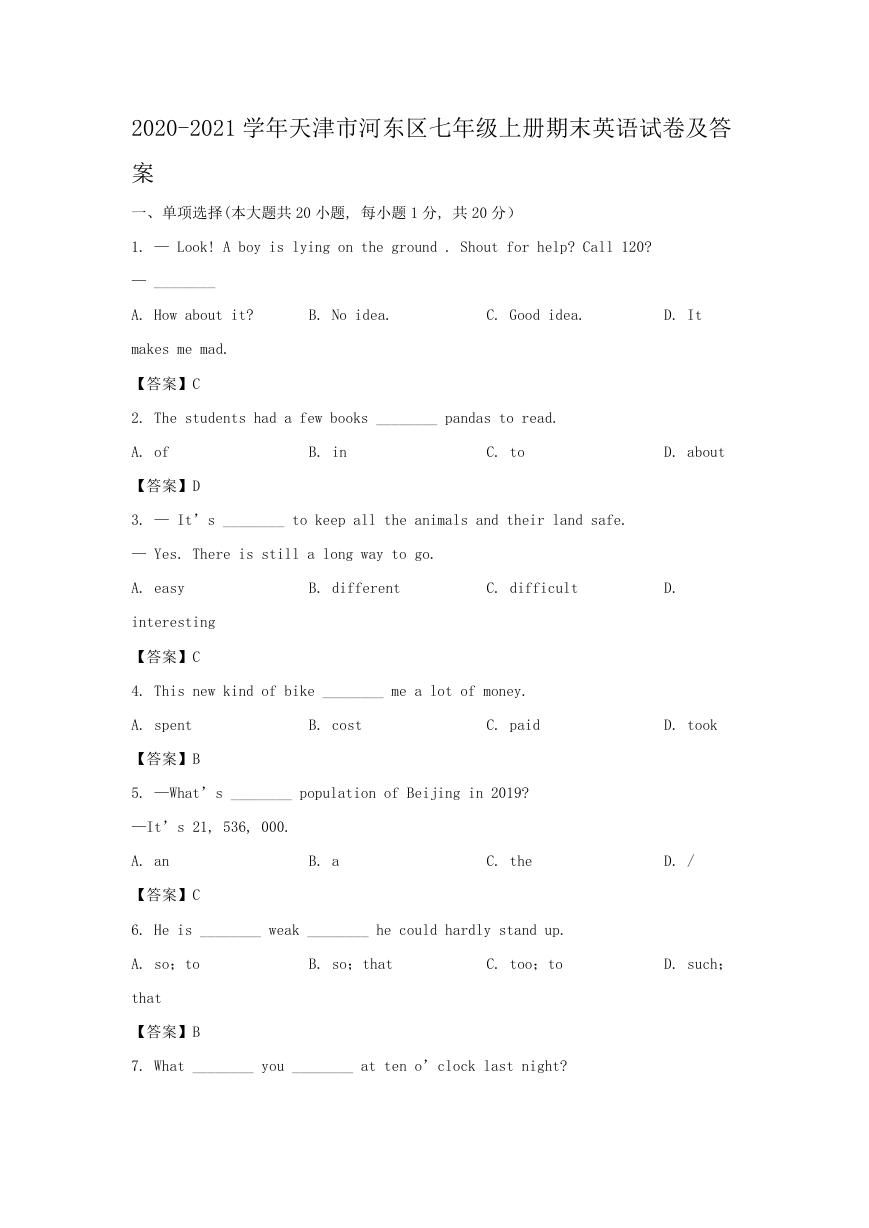
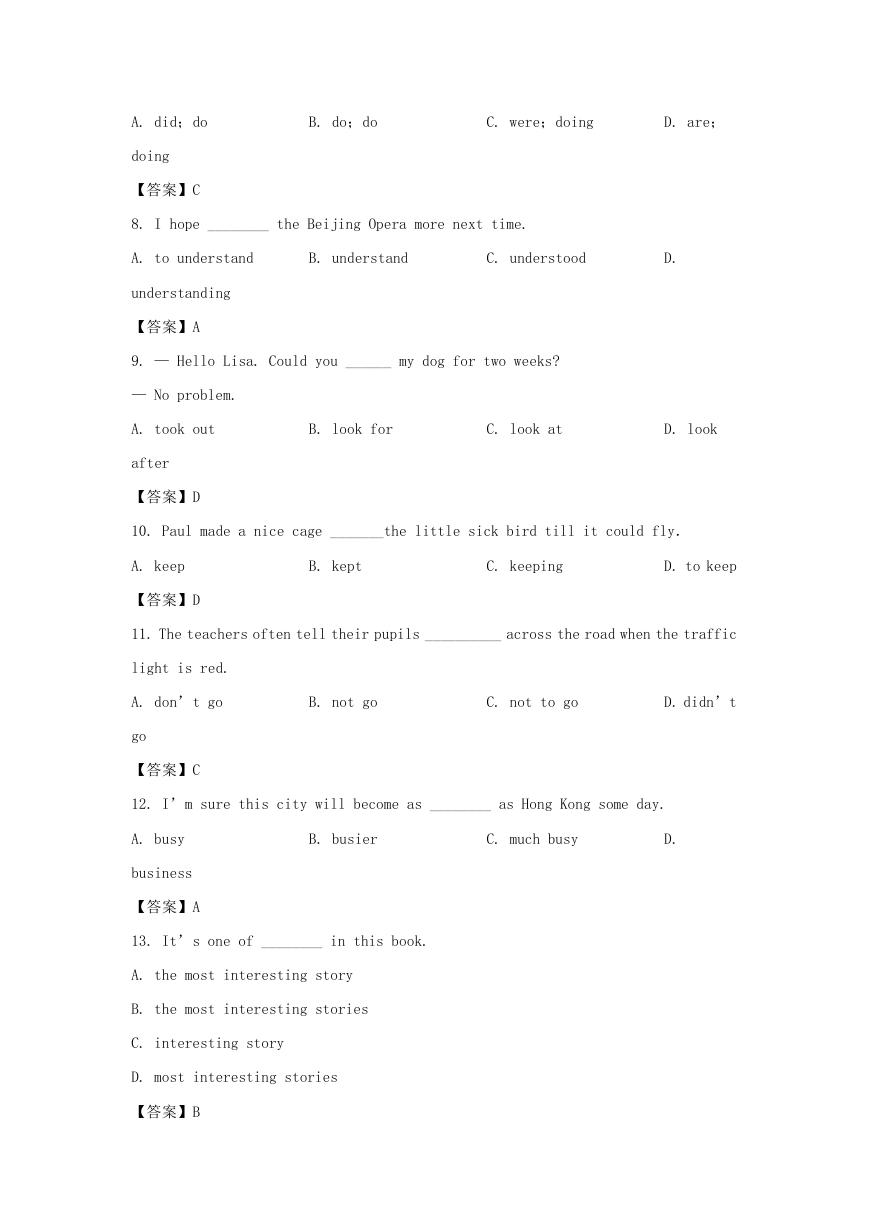
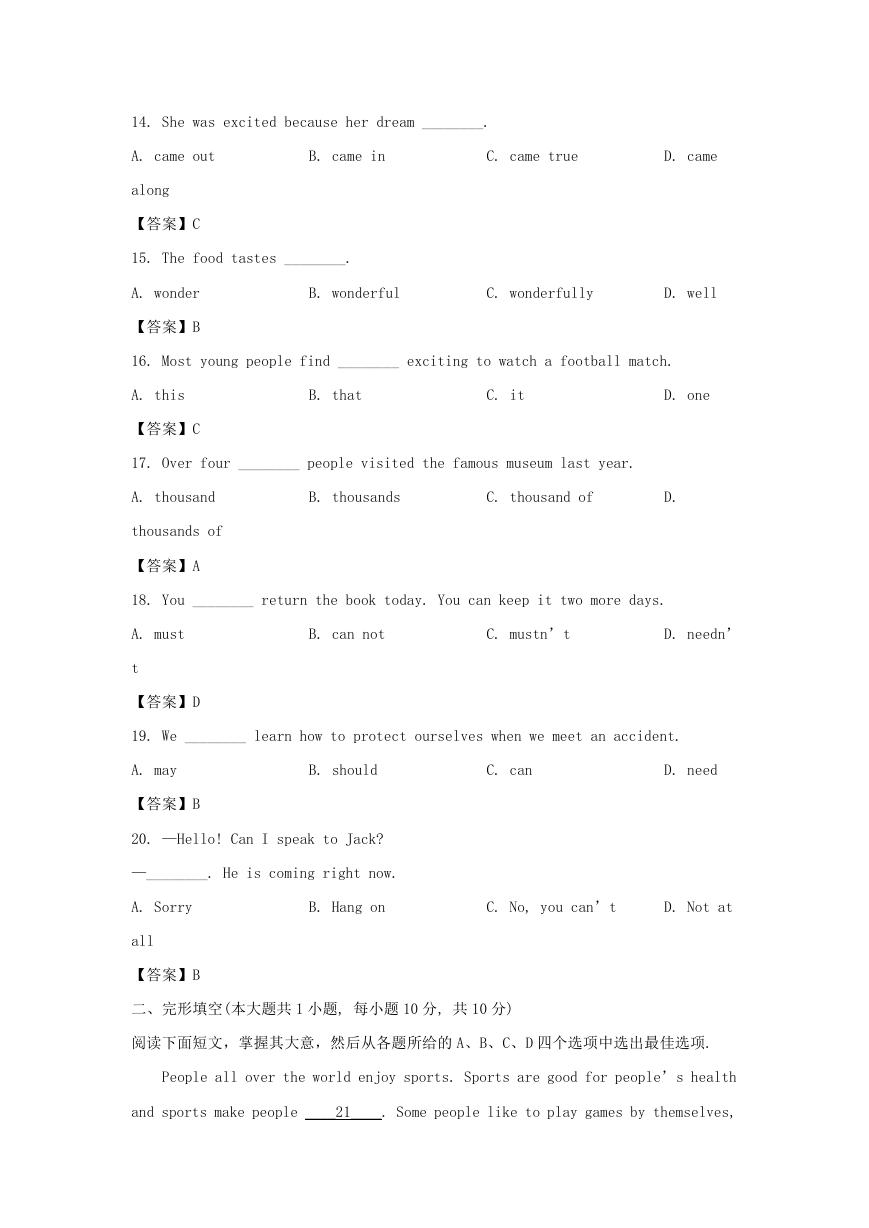
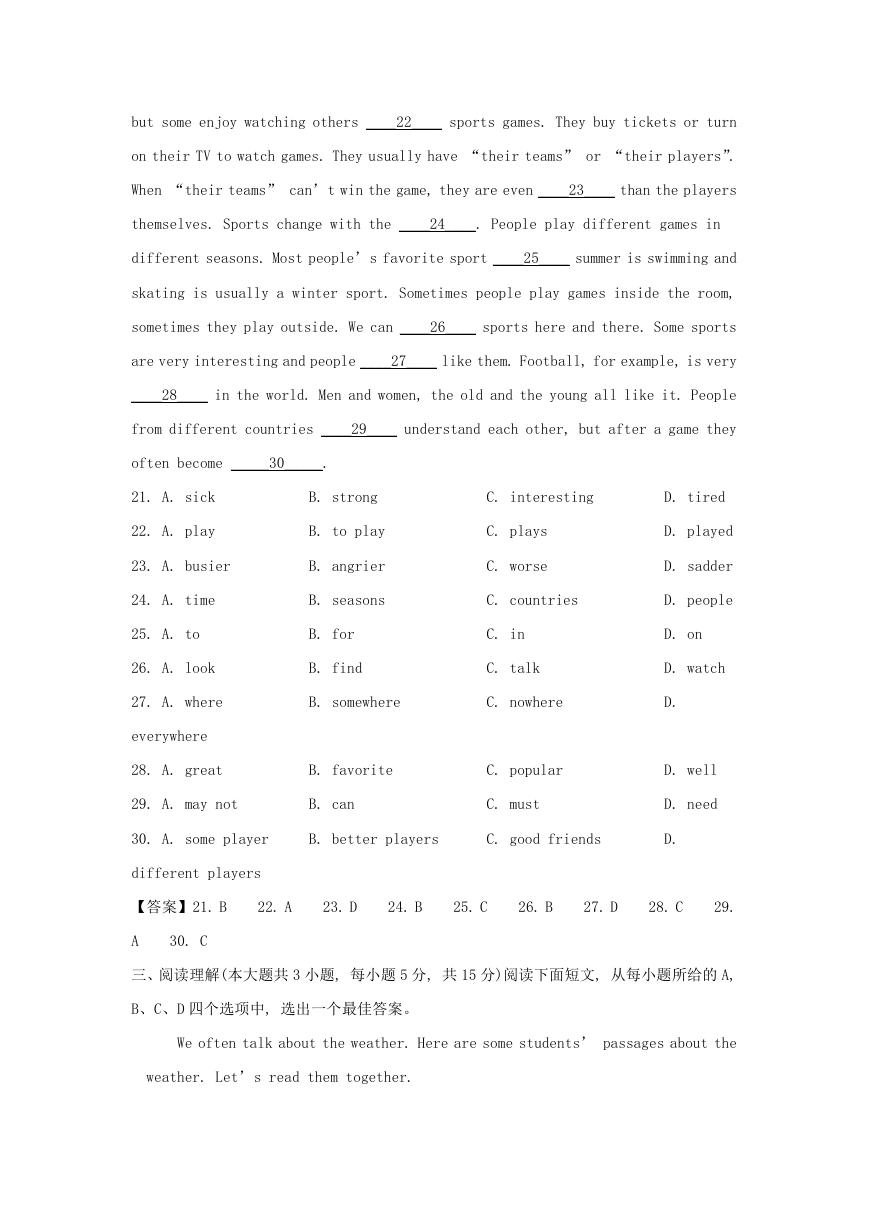
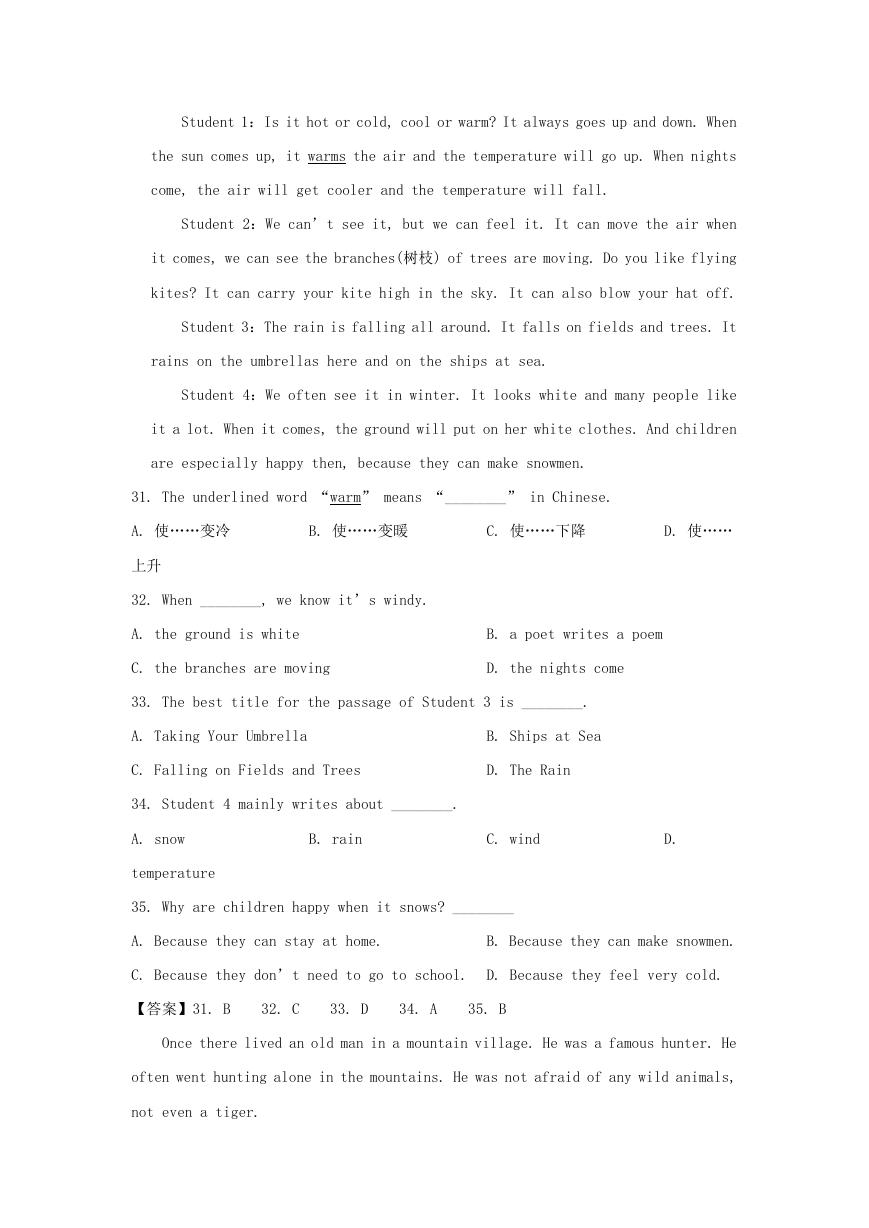
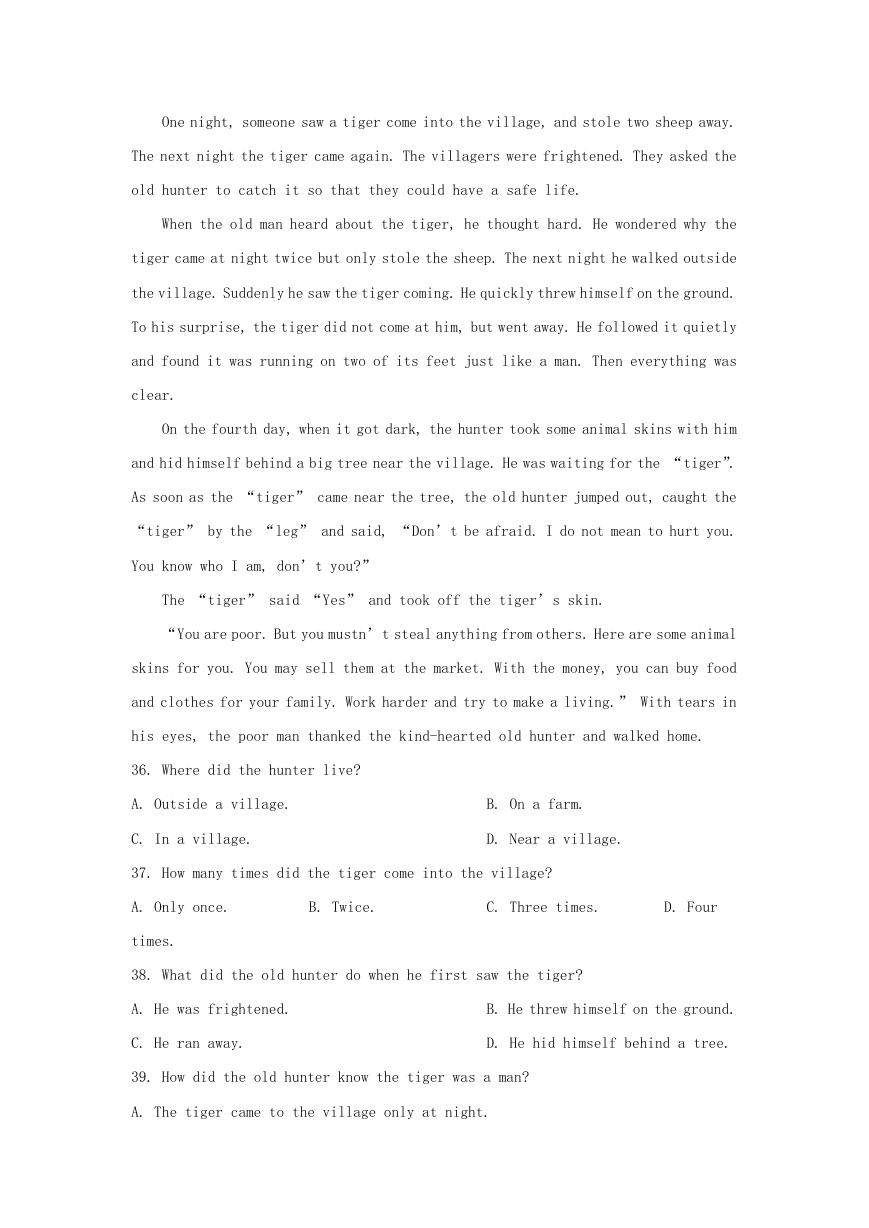
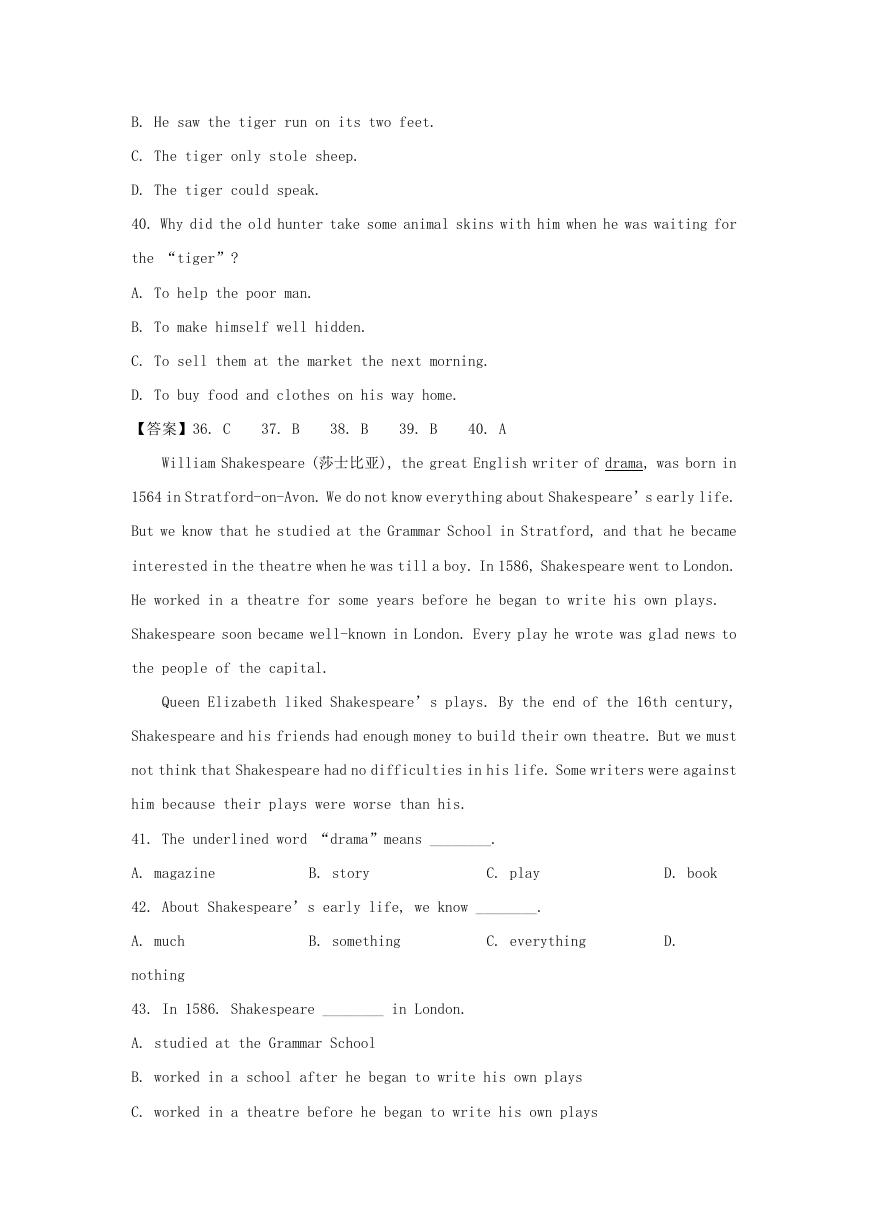
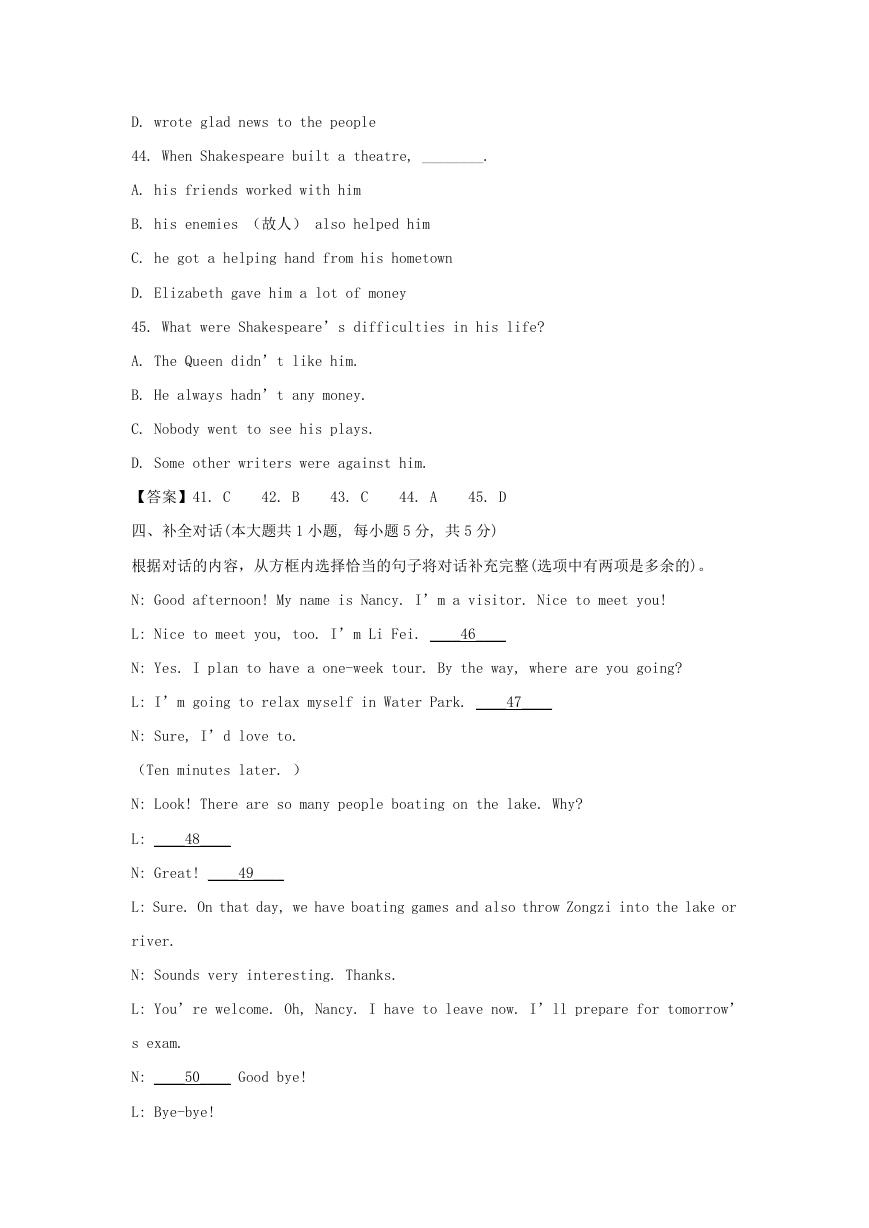








 2023年江西萍乡中考道德与法治真题及答案.doc
2023年江西萍乡中考道德与法治真题及答案.doc 2012年重庆南川中考生物真题及答案.doc
2012年重庆南川中考生物真题及答案.doc 2013年江西师范大学地理学综合及文艺理论基础考研真题.doc
2013年江西师范大学地理学综合及文艺理论基础考研真题.doc 2020年四川甘孜小升初语文真题及答案I卷.doc
2020年四川甘孜小升初语文真题及答案I卷.doc 2020年注册岩土工程师专业基础考试真题及答案.doc
2020年注册岩土工程师专业基础考试真题及答案.doc 2023-2024学年福建省厦门市九年级上学期数学月考试题及答案.doc
2023-2024学年福建省厦门市九年级上学期数学月考试题及答案.doc 2021-2022学年辽宁省沈阳市大东区九年级上学期语文期末试题及答案.doc
2021-2022学年辽宁省沈阳市大东区九年级上学期语文期末试题及答案.doc 2022-2023学年北京东城区初三第一学期物理期末试卷及答案.doc
2022-2023学年北京东城区初三第一学期物理期末试卷及答案.doc 2018上半年江西教师资格初中地理学科知识与教学能力真题及答案.doc
2018上半年江西教师资格初中地理学科知识与教学能力真题及答案.doc 2012年河北国家公务员申论考试真题及答案-省级.doc
2012年河北国家公务员申论考试真题及答案-省级.doc 2020-2021学年江苏省扬州市江都区邵樊片九年级上学期数学第一次质量检测试题及答案.doc
2020-2021学年江苏省扬州市江都区邵樊片九年级上学期数学第一次质量检测试题及答案.doc 2022下半年黑龙江教师资格证中学综合素质真题及答案.doc
2022下半年黑龙江教师资格证中学综合素质真题及答案.doc